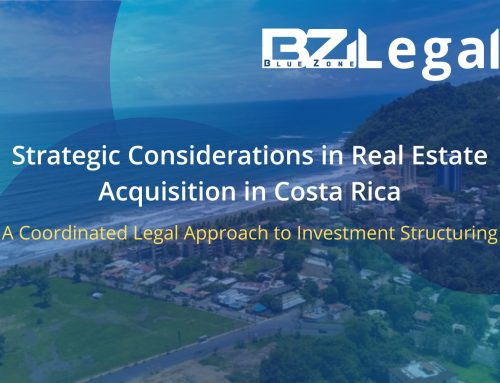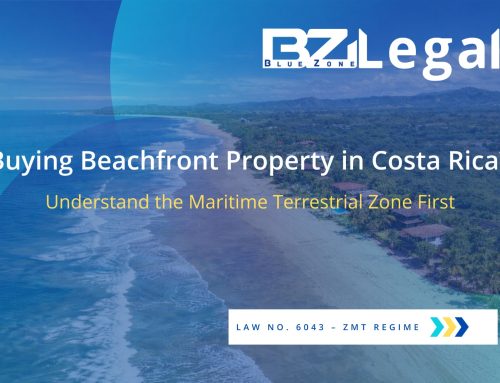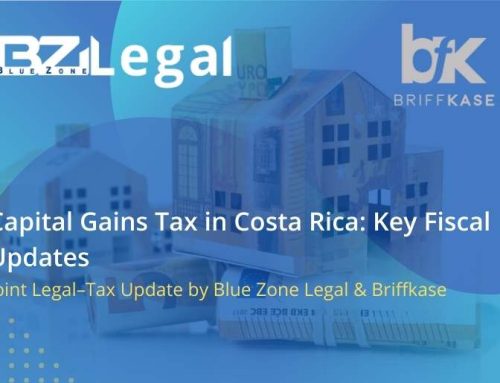(This is part 1 of a series to help Expat Investors understand and navigate the Costa Rican Real Estate market better. Blue Zone Legal is dedicated to making sure you are prepared to face any issue or legal challenge you face when buying any type of property in Costa Rica.)
Costa Rica has become a prime destination for foreign real estate investors, thanks to its stunning landscapes, stable political climate, and thriving tourism industry. However, purchasing property in a foreign country comes with its own set of challenges and legal considerations.
Here are 5 essential legal tips that every foreign investor should know when buying real estate in Costa Rica.
1. Ensure the property has a clear title.
One of the most critical steps in purchasing property in Costa Rica is verifying that the title is clear and free of any encumbrances or disputes. The National Registry (Registro Nacional) maintains a public database of all property titles, which can be accessed online. A clear title indicates that the seller is the legitimate owner and has the right to sell the property. It also confirms that the property is free from liens, mortgages, or other legal claims.
Hiring a qualified attorney to conduct a thorough title search is essential. This search will confirm the legitimacy of the seller’s ownership and ensure there are no hidden issues that could complicate the purchase. This step is indispensable, as failing to verify the title can lead to significant legal troubles down the line.
2. Get a detailed survey.
A detailed survey of the property is another crucial step in the buying process. Conducted by a licensed land surveyor, the survey accurately defines the property’s boundaries and size. In Costa Rica, property boundaries can sometimes be unclear or disputed, especially in rural areas. A survey ensures that you are buying exactly what you think you are buying and helps avoid future disputes with neighbors or other parties.
The survey should be cross-checked with the information registered at the National Registry to ensure consistency. Any discrepancies should be addressed and resolved before proceeding with the purchase. This step protects you from potential conflicts and ensures that your investment is secure.
3. Understand zoning regulations.
Zoning regulations in Costa Rica can vary significantly depending on the property’s location. These regulations dictate what can be built on the land, how it can be used, and any restrictions that may apply. Understanding these regulations is crucial, especially if you plan to develop the property or use it for a specific purpose, such as building a vacation rental or a commercial establishment.
Before purchasing, consult with the local municipality (municipalidad) to obtain detailed information about the zoning laws that apply to the property. Some areas may have restrictions on the type of structures that can be built, environmental regulations, or other limitations that could affect your plans. Ensuring that the property is zoned for your intended use will help you avoid costly legal issues in the future.
4. Check water and electricity availability.
Access to basic utilities such as water and electricity is another essential consideration when buying property in Costa Rica. In some remote or rural areas, these services may not be readily available or may require significant investment to install. Before finalizing a purchase, verify the availability of these utilities and understand the costs associated with connecting them to the property.
Water is a particularly important issue, as water rights are regulated by the government. Ensure that the property has a legal right to access water, either through a municipal supply, a well, or another source. Additionally, confirm that electricity is available and that there are no restrictions on connecting to the national grid. If these services are not readily available, it may affect the property’s value and your ability to develop it.
5. Hire your own attorney.
One of the most important steps in the real estate purchase process is hiring your own attorney. While it may be tempting to rely on the seller’s attorney or a real estate agent, it’s crucial to have independent legal representation who is solely focused on protecting your interests. A qualified attorney in Costa Rica will guide you through the entire process, from conducting the title search to ensuring that all legal documents are correctly drafted and filed.
Your attorney will also advise you on any specific legal issues that may arise during the purchase, such as taxes, residency requirements, or other legal obligations. By hiring your own attorney, you can ensure that your investment is secure and that you are fully compliant with Costa Rican law.
Stay up to date with Costa Rica’s Real Estate
Buying real estate in Costa Rica can be a rewarding investment, but it requires careful attention to legal details. By knowing the property has a clear title, getting a detailed survey, understanding zoning regulations, checking water and electricity availability, and hiring your own attorney, you can protect your investment and enjoy the benefits of owning property in this beautiful country.
For expert legal assistance, contact Blue Zone Legal at info@bluezonelegal.com or follow us on Instagram to stay updated on the latest real estate tips and legal advice. We are standing by to help you navigate the complexities of the Costa Rican real estate market. Let us guide you to make informed decisions about your future assets as a foreign investor.







Leave A Comment